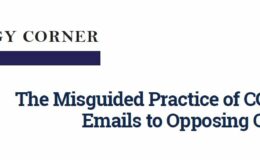Can a lawyer operate a pure internet-only “virtual law firm” where counsel never speaks or meets with the client face-to-face?
The California State Bar recently issued opinion 2012-184 saying that virtual law offices (“VLO’s”) are acceptable with some considerations.
The hypothetical setting is that clients would sign up for transactional, probate, and family law assistance purely via a secure website. The Bar (correctly) identified that there was nothing inherently wrong with that method of communication or representation as long as the lawyer was reasonably capable of ensuring that all confidences were protected. Moreover, since the lawyer would not see the client in person, the lawyer would need to go to extra steps to confirm the client’s identity, understanding of the legal advice, and that the client was technologically-capable of receiving the advice via portal and that such communications were timely.
It’s not referenced in the opinion but a lawyer operating a VLO should have some way for a client to connect via phone; throwing a myriad of forms or “walls” (such as webpages or voicemail) might trigger a breakdown in communications and tempers leading to bar complaints.
As with lawyers and cloud computing, there is an appropriate focus on security and confidentiality. This “focus” on confidentiality is good as long as it does not turn into a fascination or e-paranoia about security. Admittedly, VLOs and cloud computing are emerging technologies and reasonable consideration and care needs to be taken to ensure client confidence. But the fact remains is that law firm lease physical offices from third parties as well as use third parties for office cleaning, copier rentals/service, security, phone connections, credit card, electronic payment, trash services, outside storage, etc. Bottom line: with reasonable precautions, we have third parties in and around our client data all the time in the physical world. The fact that a third party is involved in transmission, storage or reproduction of client information in an electronic format should not be viewed as foreign or an inherent risk to security.


